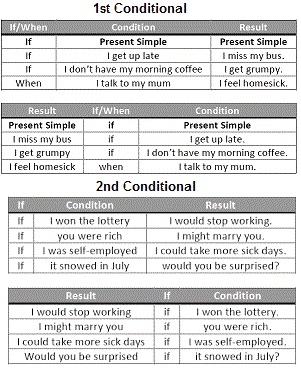1st and 2nd Conditional Tenses

Conditional tenses describe the result of something that might happen (in the present or future) or might have happened but didn’t (in the past).

1st Conditional Tenses
IF + SUBJECT + PRESENT SIMPLE, SUBJECT + WILL + INFINITIVE
SUBJECT + WILL + INFINITIVE + IF + SUBJECT + PRESENT SIMPLE
We use the First Conditional to talk about future events that are likely to happen.
- If we take John, he’ll be really pleased.
- If you give me some money, I’ll pay you back tomorrow.
- If they tell us they want it, we’ll have to give it to them.
- If Mary comes, she’ll want to drive.
- If I go to New York again, I’ll buy you a souvenir from the Empire State Building.
- If he’s feeling better, he’ll come.
- If she hasn’t heard the bad news yet, I’ll tell her.
The "future clause" can contain ’going to’ or the future perfect as well as ’will’.
- If I see him, I’m going to tell him exactly how angry I am.
- If we don’t get the contract, we’ll have wasted a lot of time and money.
The "future clause" can also contain other modal verbs such as ’can’ and ’must’.
- If you go to New York, you must have the cheesecake in Lindy’s.
- If he comes, you can get a lift home with him.
2nd Conditional
IF + SUBJECT + PAST SIMPLE, SUBJECT + WOULD+ INFINITIVE
SUBJECT + WOULD + INFINITIVE + IF + SUBJECT + PAST SIMPLE
The Second Conditional is used to talk about ’impossible’ situations.
- If we were in London today, we would be able to go to the concert in Hyde Park.
- If I had millions dollars, I’d give a lot to charity.
- If there were no hungry people in this world, it would be a much better place.
- If everyone had clean water to drink, there would be a lot less disease.
After I / he/ she /it we often use the subjunctive form ’were’ and not ’was’. (Some people think that ’were’ is the only ’correct’ form but other people think ’was’ is equally ’correct’ .)
- If she were happy in her job, she wouldn’t be looking for another one.
- If I lived in Japan, I’d have sushi every day.
- If they were to enter our market, we’d have big problems.
The form ’If I were you’ is often used to give advice.
- If I were you, I’d look for a new place to live.
- If I were you, I’d go back to school and get more qualifications.
The Second Conditional is also used to talk about ’unlikely’ situations.
- If I went to China, I’d visit the Great Wall.
- If I was the President, I’d reduce taxes.
- If you were in my position, you’d understand.
The choice between the first and the second conditional is often a question of the speaker’s attitude rather than of facts. Compare these examples. Otto thinks these things are possible, Peter doesn’t.
- Otto – If I win the lottery, I’ll buy a big house. (1st conditional)
- Peter – If I won the lottery, I’d buy a big house. (2nd conditional)
- Otto – If I get promoted, I’ll throw a big party. (1st conditional)
- Peter – If I got promoted, I’d throw a big party. (2nd conditional)
- Otto – If my team win the Cup, I’ll buy champagne for everybody. (1st conditional)
- Peter – If my team won the Cup, I’d buy champagne for everybody. (2nd conditional)
The ’If clause’ can contain the past simple or the past continuous.
- If I was still working in Brighton, I would commute by train.
- If she were coming, she would be here by now.
- If they were thinking of selling, I would want to buy.
The main clause can contain ’would’ ’could’ or ’might.
- If I had the chance to do it again, I would do it differently.
- If we met up for lunch, we could go to that new restaurant.
- If I spoke to him directly, I might be able to persuade him.
Sometimes the ’if clause’ is implied rather than spoken.
- What would I do without you? ("if you weren’t here")
- Where would I get one at this time of night? ("if I wanted one")
- He wouldn’t agree. ("if I asked him")
Information taken from https://www.englishgrammarsecrets.com/
0 comentarios